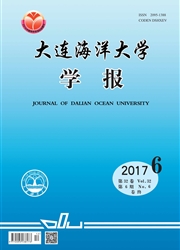

 中文摘要:
中文摘要:
为深入探索酶催化技术在海洋石油污染处理中的应用,以游离辣根过氧化物酶(HRP)催化降解海水中柴油污染,研究了酶用量、溶液p H值、柴油初始浓度和催化反应时间等因素对酶催化降解海水中柴油污染的影响,确定了HRP催化降解海水中柴油污染的优化工艺条件,同时考察了反应助剂对海水中柴油污染去除率的影响。结果表明:HRP能有效催化降解海水的柴油污染,当海水中柴油的质量浓度为1.2g/L时,在温度为25℃、HRP加入量为1.6 U/m L、H_2O_2为250 mg/L、溶液pH为5的条件下,催化降解3 h,柴油去除率可达90.77%;聚乙二醇(PEG)对HRP催化降解海水中的柴油污染有较显著的影响。
 英文摘要:
英文摘要:
The influence of dosage, solution pH value, diesel initial concentration and catalytic period on free horseradish peroxidase (HRP) degradation of marine diesel pollution were studied and optimized for the process conditions by orthogonal experiment to exploite utilization of horseradish peroxidase in the catalytic oxidation degra- dation of marine diesel pollution. The removal of marine diesel pollution by a reaction promoter was observed. The results showed that free horseradish peroxidase was shown to degradate the diesel pollution in the seawater effective- ly under the optimum conditions of diesel initial concentration of 1.2 g/L, temperature of 25 ℃,HRP activity con- centration of 1.6 U/mL, H202 mass concentration of 250 rag/L, pH 7.5 and reaction time of 3 h, with the diesel removal rate of 90.77%. It was found that polyethylene glycol (PEG) improved the efficiency for HRP catalytic oxidation in seawater diesel pollution.
 同期刊论文项目
同期刊论文项目
 同项目期刊论文
同项目期刊论文
 期刊信息
期刊信息
